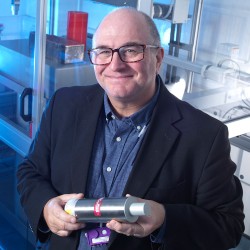Nuclear structure for the astrophysical r-process
Start date
1 October 2024Duration
3.5 yearsApplication deadline
Funding source
UKRI and/or University of SurreyFunding information
We are offering the UKRI standard stipend (currently £18,622 per year) with an additional bursary of £1,700 per year for full 3.5 years for exceptional candidates. In addition, a research, training and support grant of £3,000 over the project is also offered. Full home or overseas tuition fees (as applicable) will be covered.
About
The rapid neutron-capture (r) process produces about half of the nuclei heavier than iron. How this happens in exploding stars is one of the great open questions in physics. To understand it requires information on both the properties of the nuclei involved and also the astrophysical environment.
This project focuses on the nuclear structure aspects. The isotopic abundances of elements produced in the astrophysical r-process show a wide peak near mass A=190, connected to the neutron magic number N=126. Therefore, abundance calculations rely on understanding the properties of nuclei with N=126, representing isotopes that were never observed on Earth. In order to improve abundance predictions this project will study the structure of the most exotic isotopes that can be synthesised.
Two experiments will be performed. First, the evolution of single-proton orbitals will be studied in the 206Hg+t->205Au+3He reaction at CERN-ISOLDE. This will measure the energy of proton-states in the N=126 205Au nucleus using the ISOLDE Solenoid Spectrometer recently developed by the UK. In addition, information on the proton-proton interaction will be obtained by measuring the internal decays of long-lived isomeric states in N=126 nuclei 202Os and 201Re. This experiment will be performed at the RIKEN laboratory in Japan where the Surrey group has initiated a programme by leading efforts to develop the required intense primary 208Pb beam. The results will refine nuclear shell model calculations, improving the predictions of nuclear properties such as masses and lifetimes, and thus place constraints on the astrophysical environments where the r-process can occur.
Eligibility criteria
Open to both UK and international candidates.
Up to 30% of our UKRI-funded studentships can be awarded to candidates paying international rate fees. Find out more about eligibility.
You will need to meet the minimum entry requirements for our Physics PhD programme.
How to apply
Applications should be submitted via the Physics PhD programme page. In place of a research proposal, you should upload a document stating the title of the project that you wish to apply for and the name of the relevant supervisor.
Studentship FAQs
Read our studentship FAQs to find out more about applying and funding.
Application deadline
Contact details

Studentships at Surrey
We have a wide range of studentship opportunities available.

